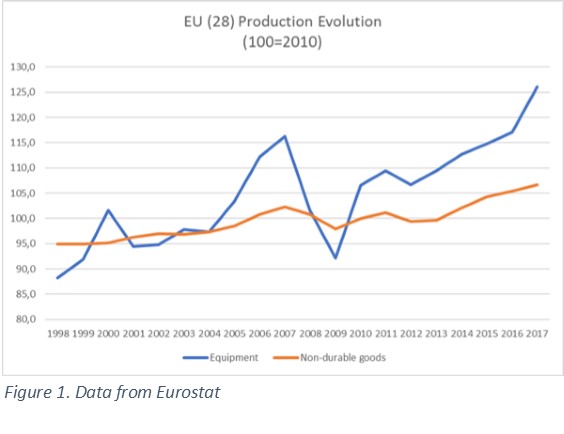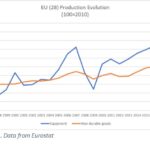The positive development of machinery sales in the last years keeps breaking records with an economic cycle that will soon end.
EUROMAP and EUROSTAT report machinery production growth of 7% in 2017. For the first half of 2018, VDMA reports a continued growth of 4% in the production and trade of German industrial machinery and equipment. In the last 8 years machinery production has grown 26% compared with 6% of non-durable manufactured goods in Europe. Many of the machines ordered at the end of 2017 and during the first half of 2018 will be soon installed completing a tremendous world-wide capacity in production increase. In 2017, however, plastic product production of the 19 EU-countries has been stagnant with increases of only 0.57%. Well intentioned European Governments keep stepping on the fiscal pedal to increase productivity and price competitiveness in their industries. This is the case of the three-year long fiscal stimulus that the Italian Government keeps offering Italian manufacturers with their “super-amortization” of capital equipment investments; or the subsidies of the Hungarian Government to the Capital Equipment Investments. Norway is another example where the machine production over the last year grew 100% more than the manufacturing production. However, this stimulus can generate large market imbalances. For example, G20 Countries agreed last November that industrial subsidies should be eliminated to correct industrial production over capacity in the steel market with enormous Chinese surplus, and the plastics or beverages industry is suffering the same overcapacity.
All together this makes an irrational industrial surplus that has been pushing global production of non-durable consumption goods and is partly responsible for the low inflation world-wide. New Machine Manufacturers have been living in the best environment possible since 2010. Like after the exuberant period from 1998 to 2008, an important correction is expected.
After analyzing machinery production and manufacturing statistics and international bond prices in the last 30 years, I expect that 2019-2020 will bring a 10% correction in the machinery industry. Demand will recede, new and used machinery prices will fall and excessive capacity production will be corrected
The 1992-93 crisis was triggered by the failure of the European Monetary System (EMS) -EMU after Maastricht in 1991. The 2001 crisis was a consequence of the Y2K scare, the dot-com bust, high interest rates and the September 11th attacks. All this generated a contraction of the economy. The 2007-2008 financial crisis began with the subprime mortgage crisis, which developed into a full-blown banking crisis, credit constriction, the fall of Lehman Brothers, etc. The 1992 and 2001 crisis hit the machinery industry with a 11% contraction each time. The 2008 crisis produced a 25% contraction.
I may be wrong, but I expect that the 2019-20 crisis for the machinery industry will be triggered by a 2-3% demand contraction of industrial products after materializing any combination of global risks such as trade wars, no-deal Brexit, Italian euro crisis, migrant crisis, emerging markets slump (as it is happening with the Turkish Lira) or higher oil prices due to renewed sanctions to Iran oil and economy.
The consequences of the overcapacity were painfully felt by the industry in 2008 and took some years to leave behind. The current situation is not as exuberant as the economy was in 2006, but learning from the past, industrial companies should reduce excess capacity before the used machinery market gets saturated.
MachinePoint purchases, sales and relocates used industrial machinery in the plastics and Beverages markets. 20 years of existence enables us to channel excessive supply in an efficient and reliable way. Sellers interested in reducing industrial capacity need expertise, market knowledge and a reliable partner. Growing Companies in India, China, Africa or Latin-America use MachinePoint to execute their investments in the smartest and most reliable manner. We do not buy to stock but guarantee our reselling services by showing most of the machines for sale in running condition in the location where they were operated and maintained. This guarantee has been proven again and again by large and small companies that have become loyal customers.
Our international presence is reinforced by hundreds of industrial professionals collaborating to sell or search for used machinery. In times of surplus machinery our internet presence and our extensive and specialized sales network are key to relocate excess machinery in market niches. Good machinery brands sell faster than bad brands which are in cases scrapped. Prices tend to fall when there is an excess of machinery in the market, if the reseller is not an industrial expert. Excessive supply does not need to mean lower prices, but a better match at the right price when enough demand is stimulated. In any case, while the new machinery market contracts, the used machinery market is growing and becoming more interesting for buyers and sellers.

César Rodríguez Gabilondo
CEO & Founder of MachinePoint Consultants
Linkedin Profile





